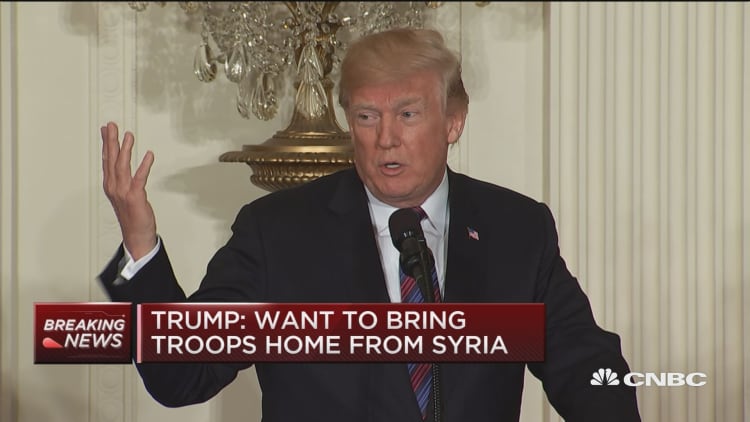Russia's foreign intelligence agency chief has said it feels like a return to the Cold War era as frosty relations between Russia and the West continue after accusations that Moscow was behind the poisoning of a former Russian spy in England.
"Washington has become fixated with the fight against a non-existent, so-called Russian threat. This has reached such proportions and acquired such absurd characteristics that it's possible to speak of a return to the dark times of the Cold War," Sergei Naryshkin said according to Reuters, speaking at a security conference in Moscow.
Naryshkin's comments come as the Organization for the Prohibition of Chemical Weapons (OPCW), the world's chemical weapons watchdog, holds a meeting at Russia's request to discuss Britain's allegations that Moscow was behind the poisoning of a former Russian double agent and his daughter with a military-grade nerve agent.
The British delegation to the OPCW tweeted on Wednesday morning that Russia's proposal for a joint probe into the attack was "perverse."
The attack took place in early March and the U.K. quickly accused Russia of being behind the attack. Former spy Serge Skripal remains in a critical but stable condition in hospital whereas his daughter Yulia's condition has improved.
The agent used was part of the Russian-made Novichok family of deadly chemical weapons but Russia has repeatedly denied any involvement.
Russia's foreign ministry is due to hold a press conference immediately after the OPCW meeting.
Ahead of the meeting, it tweeted a list of questions it had sent to the OPCW surrounding what it called the "fabricated" Skripal case.
On Tuesday, Russian President Vladimir Putin said in a press conference in Turkey that he hoped the chemical watchdog would put a full stop to accusations that Russia was involved. Putin has not spoken about the attack much, but added that he was surprised "how quickly an anti-Russian campaign unfolded."
Intelligence chief Naryshkin said Wednesday that the poisoning was "an act of grotesque provocation crudely concocted by the U.S. and British security services."
Other notable experts have also ventured that Russia might not have been responsible for the poisoning of the Skripals, casting doubt over the U.K.'s accusations and international response.
On Tuesday, the chief executive of the Defence Science and Technology Laboratory at Porton Down, a chemical weapons research laboratory near Salisbury, told Sky News that the laboratory had not yet identified "the precise source" of the nerve agent and thus was unable to say whether it had come from Russia.
Ulrich Schmid, a professor of Russian Culture and Society at St.Gallen University in Switzerland, also told CNBC Wednesday that he had doubts over state involvement in the attack.
"My contention is that it is quite unlikely that the Kremlin or even Putin ordered the poison attack in Salisbury. Skripal had been cut off for more than 10 years from classified information," Schmid noted.

"The timing of the attack is also indicative: It occurred two weeks before the presidential elections and three months before the World Cup. Such a scandal was clearly not in the best interest of the Kremlin," he said.
Rather, the academic said "an influential group within Russia may be responsible for the attack, just to show off their power to the Kremlin."
"Of course the Kremlin can't even come up with a similar allegation, because they would have to admit at the same time that they're not in control of things. If this scenario is true, the elites in the Kremlin would find themselves in a very awkward dilemma."
The possibility that Russia might not have been responsible for the attack could have grave ramifications, given the tough international response so far and show of solidarity towards the U.K.
Some countries in Europe — particularly long-term Russian allies including Bulgaria, Serbia and Greece — did not expel any diplomats, however.
Remarking on this earlier on Wednesday, Russian intelligence chief Naryshkin said "some European governments are not following London and Washington blindly but are instead choosing to carefully make sense of what happened."



